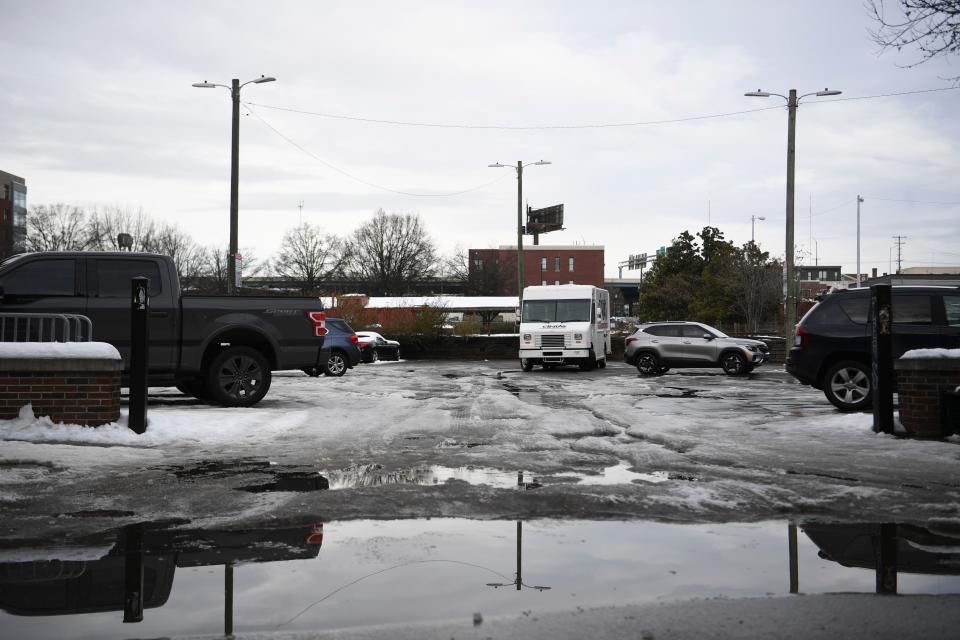What do rain, melting snow mean for Tennessee River levels? What TVA says about flooding
With melting snow, rain in the forecast and the National Weather Service warning of potential stream and river flooding, there are still plenty of weather conditions to watch out for.
Even though the Tennessee Valley Authority is forecasting 3-5 inches of rain across the Tennessee Valley through Jan. 27, the public utility does not expect flooding on the Tennessee River or its tributaries, given the current forecast, and is prepared to manage rising water levels.
TVA does not, however, control local flooding on streets when creek beds overflow or street drainage backs up. Knox County and the city of Knoxville are responsible for local flood mitigation and have their own flooding prevention plans.
In a video posted to TVA's social media pages Jan. 24, Darrell Guinn, senior manager of TVA's River Forecast Center, said the agency anticipates excess runoff in winter by lowering reservoir levels in advance.
Knox Your Knox: Is downtown Knoxville on Fort Loudoun Lake or the Tennessee River?
"Expect the reservoirs to rise through the weekend and see the flows expected to pick up along the main river," Guinn said in the social media post.
TVA isn't worried so much about melting snow, because it equals only 0.5 to 1 inch of rain, an amount it is more than used to handling. Runoff into the Tennessee River will be faster, though, thanks to the saturated ground.
From its River Forecast Center at its downtown headquarters, TVA controls water levels across the Tennessee River and its tributaries to help prevent flooding by storing water in reservoirs.

The federal utility is spilling water through five of its nine river dams to create more space for runoff and rain this week. Some of its reservoirs — Chickamauga, Pickwick and Wheeler — could reach summer levels.
TVA steps in once the water reaches the main tributaries of the Tennessee River, which stretches 652 miles from Knoxville to Paducah, Kentucky. For instance, TVA does not control flooding of First Creek, which runs through Knoxville, but controls that water once it flows into Fort Loudoun Lake.
The National Weather Service warned on Jan. 24 that the coming rain would cause the biggest flood risk in "flood prone areas or along local streams in areas that either received the heaviest snowfall, or just downstream of the remaining snowpack."
Knoxville is expected to get up to 2 inches of rain through the morning of Jan. 26, while areas farther west, like Kingston, could get up to 3 inches.
Especially in East Tennessee, which catches heavy runoff from the Smoky Mountains, storing water in tributary reservoirs before it gets to the main river helps prevent flooding.
The stored water is also critical for generating power at TVA's 29 hydroelectric dams when power demand surges, like it did during frigid temperatures this past week, when the agency broke its all-time demand record.
TVA app lets you track water levels
Anyone can get a small taste of the data at the River Forecast Center with the TVA Lake Info app, available for free download on the App Store or Google Play.
The app tracks live water levels on either side of TVA's dams and how much water is discharging through the dams each hour. It also has maps of TVA's dams and reservoirs, daily water release schedules and history of the TVA system of lakes.
How Knox County recommends flood prevention
Knox County regulates development to prevent flooding and minimize flood damage, like requiring minimum floor elevations for new buildings. It also provides tips to residents for how they can help prevent flooding in their communities:
Don't dump trash or litter into streams, drains or ditches. It's illegal, and it also contributes to local flooding, even if it's yard waste.
Don't block storm drains
Report suspected grading or development to Knox County Construction Services at 865-215-5540 or stormwater@knoxcounty.org
Report illegal dumping to stormwater@knoxcounty.org
Keep your yard clear of debris, especially if you live in a floodplain or near a drain. Allow native vegetation to grow up along the stream, which makes soil more stable and soaks up water.
Make sure you have a permit for developing in a floodplain.
Not sure if you live in a floodplain? Contact the county at 865-215-5540 or stormwater@knoxcounty.org.
Daniel Dassow is a growth and development reporter focused on technology and energy. Phone 423-637-0878. Email daniel.dassow@knoxnews.com.
Support strong local journalism by subscribing at knoxnews.com/subscribe.
This article originally appeared on Knoxville News Sentinel: Knoxville rain forecast won't cause Tennessee River flooding, TVA says

